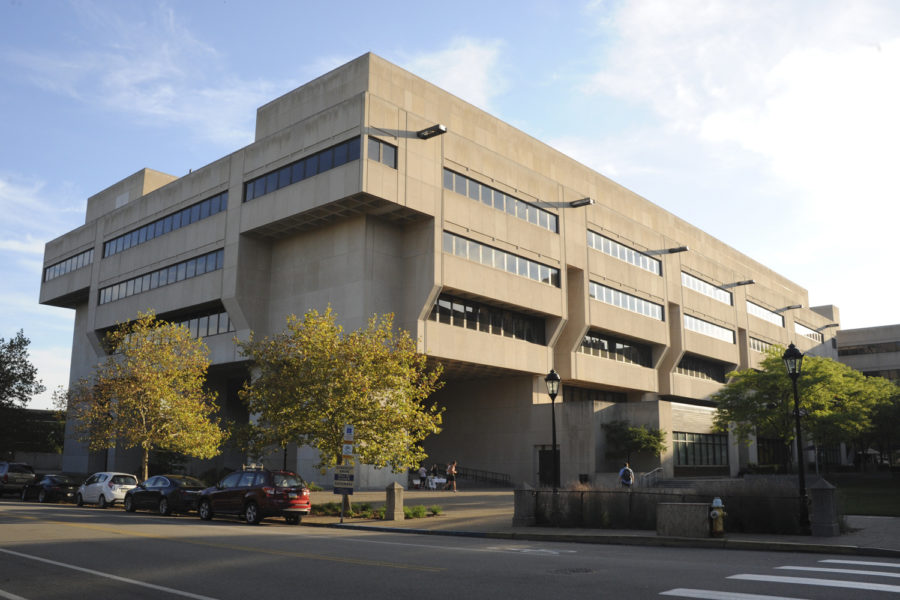A Pitt faculty member is challenging the effectiveness of shared governance at Pitt.
Omid Shekari, an assistant professor of studio arts, published a letter to the editor in The University Times on Sept. 5, stating that he believes the Senate operates as little more than a “bureaucratic body” that “wastes hours of faculty time” without wielding meaningful power.
His central argument focuses on two main issues — the advisory nature of Senate recommendations and the administration’s refusal to share detailed investment information with a committee that oversees the budget.
The University maintained that its governance structure follows standard practices for higher education institutions.
“Like many institutions of higher education, the University of Pittsburgh operates under a shared governance model,” University spokesperson Jared Stonesifer said, adding that administrators “consult regularly with the Senate, its officers or its committees.”
Shekari’s letter challenges the fundamental structure of Pitt’s shared governance.
He pointed to University bylaws Article IV, Section 4.1, which states that “the Chairperson and the Chancellor and Chief Executive Officer are authorized to sign contracts and other instruments on behalf of the University and may delegate all or any part of such authority to any other person or persons by instrument in writing.”
Shekari argued that this provision, along with other sections of the bylaws, demonstrates that all effective power resides with the Board of Trustees, the chancellor and the chief executive officer, with nothing in the bylaws indicating genuine shared governance or defining the Senate’s role. In his interpretation, the bylaws grant ultimate legal and contractual authority to top administrators without requiring Senate input or approval.
Senate President Kristin Kanthak said the Senate’s recommendations have been consistently implemented during her time with the body.
“I honestly cannot think of a time that a recommendation from the Faculty Assembly or Senate Council was ignored,” Kanthak said. “In that sense, I would put the implementation rate at 100% for the eight or so years I’ve been involved with the University Senate.”
She pointed to former Senate President Robin Kear’s 2023 plenary on Artificial Intelligence as an example, noting that it resulted in the creation of PASTA, the Pitt Artificial Intelligence Scholar-Teacher Alliance.
Divestment transparency was also a core incentive for Shekari’s letter to the editor.
His critique stems from attempting to access information about the University’s $6.1 billion Consolidated Endowment Fund, which generates income for scholarships, faculty salaries and University operations.
Shekari has been on the Senate’s Budget Policies Committee since 2023 and served as co-chair of the committee from January to June 2025. He nominated himself for the position to investigate the nature of Pitt’s endowment investments, a concern that gained urgency after pro-Palestine campus demonstrations called for divestment from companies connected to Israeli operations.
After months of correspondence with the University finance office, CFO Dwayne Pinkney and Chief Investment Officer Jeffrey Choudhry attended the Budget Policies Committee’s final meeting on June 20.
At that meeting, Shekari requested access to the University’s investment list and offered to sign a nondisclosure agreement to protect sensitive information. According to Shekari, Pinkney denied the request.
“If the administration will not grant access to information that is literally under the purview of the committee, how are we participating in shared governance?” Shekari wrote.
Stonesifer said the University only discloses endowment investment information through public reports like “audited financials, the University ESG Report and our Statement of Governance, and the IRS filings.”
According to Stonesifer, the University “does not comment publicly on its investment holdings beyond what is publicly available.”
In a joint statement published alongside Shekari’s letter in The University Times, current Senate President Kanthak and immediate past president Kear wrote that “the current leadership and immediate past leadership of the University Senate continue to work toward open dialogue, conversation and collaboration on all matters of University-wide concern in our advisory capacity.”
Shekari concluded his letter by stating he believes “the University Senate does not participate in Pitt shared governance because shared governance happens when power is decentralized and where there is a clear system of checks and balances.”
He maintained that as an educational institution, Pitt must not “profit from war,” and urged the University to divest from companies that could reflect that notion.
“I would like to ask either the University, the Senate, AAUP or faculty union to hold a referendum to all faculty members on whether they agree or not that Pitt must divest from all weapons manufacturing companies, as well as those institutions, organizations and companies that work with the Israeli government and entities,” Shekari wrote.

